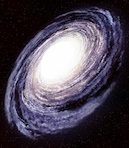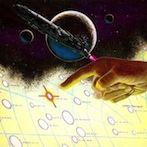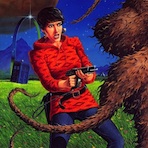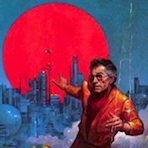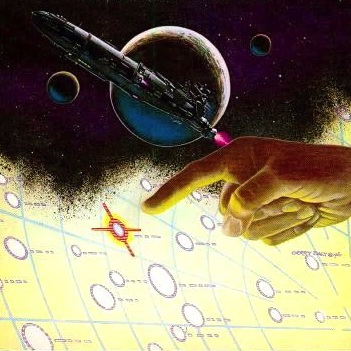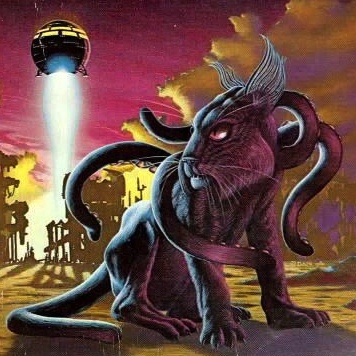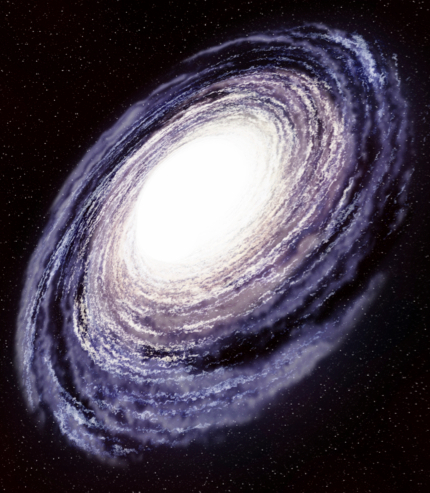This review contains numerous plot spoilers.
Read on at your own risk.
For a spoiler-free review, read Daniele Bitossi's.
June 1st, 2008
Continuum Indeed
Null-A Continuum lives up to its predecessors and nicely fulfills its role as the final installment of the Null-A series. The World of Null-A, the first book, was very much an impromptu patchwork novel. The magazine version clearly was made up as van Vogt went along, with random (and often bad) ideas thrown in and then disregarded or unconvincingly explained later in the story. Although the book version rectified many of these inconsistencies, the "patchwork" feel remained but was changed from being sloppy surrealism into something far greater: a multilayered reality that would become the trademark of a later writer, Philip K. Dick. Those loopholes were turned into doorways leading onto massive paradigm shifts.
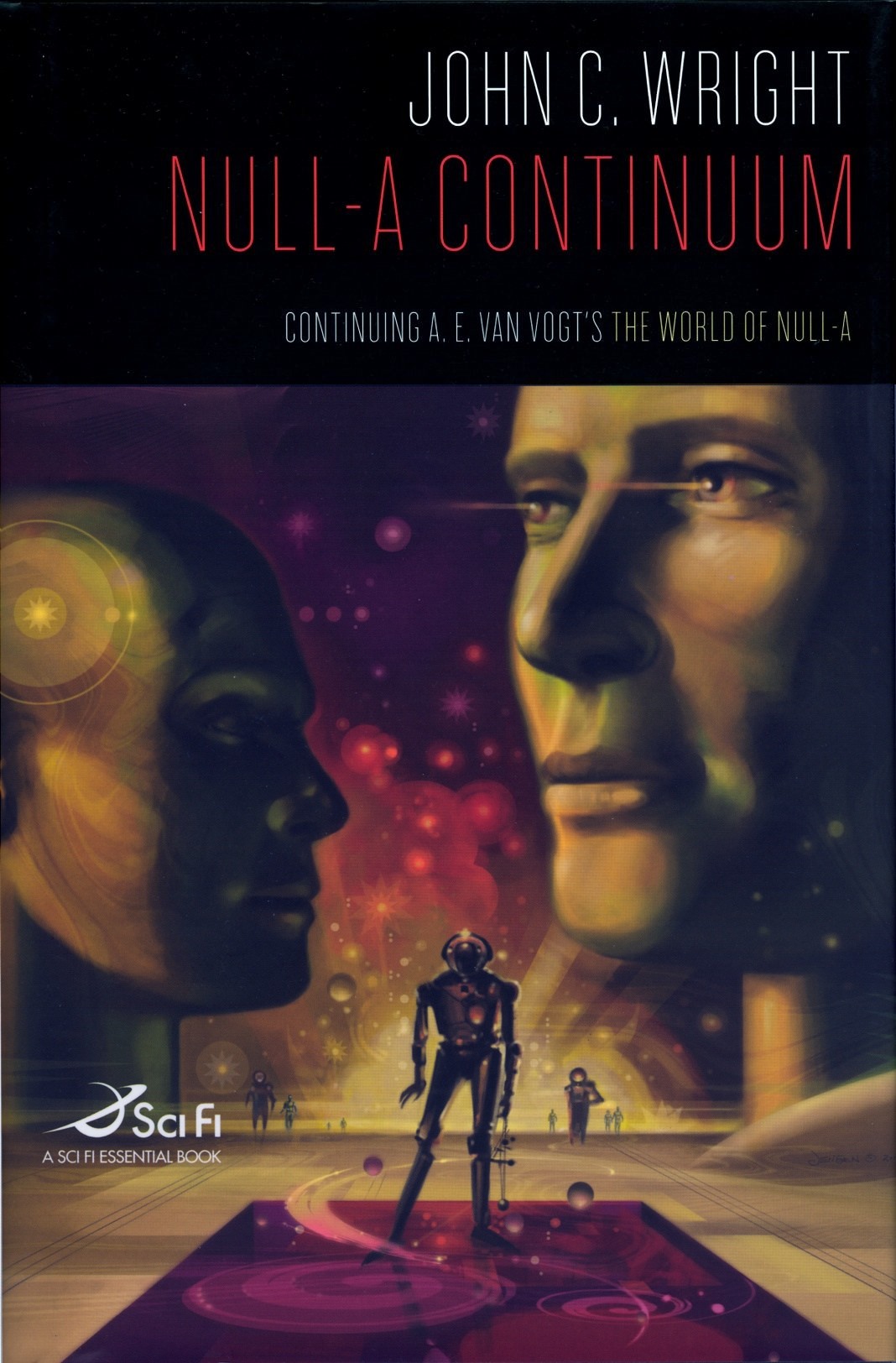
cover art © Bruce Jensen
So from the very start, the Null-A series was always revising itself as part of the story. The "facts" as understood by Gosseyn are there to be overturned at more-or-less regular intervals. The second novel, The Players of Null-A, continued this tradition, though it did so more subtly and was better planned from the beginning.
Null-A Three, on the other hand, basically threw the first two books out the window and only detracted painfully from the series. I first read Null-A Three some time in the mid-1990s, so when I read it again several weeks ago I was pleasantly surprised that it was more engrossing than I had remembered. I made it all the way through in just three days, and could hardly put it down. It wasn't nearly as bad as I remembered it. I can now see that the main reason I disliked it so much was because the prose style had a great deal of strangely unnecessary detail and verbal clutter; van Vogt may have never been a master prose stylist, but the style of Null-A Three was just appalling. Also, whenever I thought of this book, I couldn't really remember anything in particular that happened — when re-reading it, I realized with some surprise that this was because very little actually happens, and very little of what does happen is worth remembering.
Continuum is preceded by a "Author's Note" in which Wright does a fine job of summarizing the first two Null-A novels, highlighting elements of particular significance (which he expands on in his continuation of the story). And what about Null-A Three, you ask? Well, Wright has quite sensibly discarded the bulk of it while retaining the odd bit here and there, while explaining his (excellent) reasons for doing so in his introduction. I believe this is a very wise course of action, as we can now largely disregard that unfortunate chapter in the life of Gilbert Gosseyn, and salvage only that worth preserving. But depending on your own appraisal of Null-A Three, you will find Wright's decision to be either a great relief or a great betrayal.
Judging A Book By Its Author
John C. Wright is well-known — or "notorious," depending on one's viewpoint — for being a bellicose person with very strong opinions that he doesn't mind sharing at great length. And although I agree with him on numerous issues — first and foremost in our shared faith in Jesus Christ — there are nonetheless just as many issues where I think he is flat wrong or, at the very least, sadly misguided. And although I drop by his blog almost daily, I myself am a timid little hobbit who shies away from controversy and heated debates. I'm also not much of an intellectual and find philosophy incredibly tedious and dull. Therefore my visits to his blog usually last only a few seconds as I read the topic heading (for example, as I write this the current one is "The Practicality of Idealism") and my eyes completely glaze over.
Many people will read Null-A Continuum and look for reasons to dislike it, merely because they do not like John C. Wright. And while this sort of thing is inevitable with such a controversial author, I do think it is unfair. If all of us judged books or music or films based on the religious and political views of their authors, and not on the actual content of their creative works, I doubt that anybody could ever in good conscience absorb anything created by anyone else. A book should be judged solely on its own merits. If the author's views spill over into the book, and it's clearly little more than a platform for spouting his own ideas — particularly ideas that you disagree with — then it would indeed be more than fair to judge the book on those grounds. Indeed, I find any fiction with any religious or political slant tiresome to read, even when I do agree with what is being presented. And when it comes to science fiction in particular I'm very much a purist — SF is the creation of new worlds, and it shouldn't be used as a platform for contemporary issues.
For example, from the late '50s onward the work of Robert A. Heinlein falls firmly into this category. Starting with Starship Troopers, his fiction took on a "manifesto" quality wherein he transparently advocated his own radical views on politics, religion, and sex, and as the years went by his novels consisted more and more of his characters wittily expounding on these tenets to the exclusion of all else. Most people critical of Heinlein (myself included) judge these works primarily based on how their own views conflict with Heinlein's, and given the nature of those works I think the standard of judgment is a fair one.
On the other hand, I must admit to enjoying the works of L. Ron Hubbard, even his novels from the 1980s. I am fully conversant with the evils of both Dianetics and Scientology, and I firmly believe that everyone at the very least should read Russell Miller's Bare-Face Messiah: The True Story of L. Ron Hubbard (which has, thank God, been officially condemned by the Church of Scientology, so it's clearly something you need to read). While being aware of the rank hypocrisy demonstrated by the high moral tone of his novels, in which many of the things Hubbard did in his life are condemned, when judged on its own merits his fiction is easy to read and vastly entertaining — not excellent, granted, but enjoyable and amusing.
All that said, I would like to emphasize that Wright has gone to great lengths to make this a van Vogt novel, not a John C. Wright novel. Continuum is not a soapbox for his own opinions — it's a van Vogtian story in every sense of the word. It does however have some distinctly Wrightian touches, some good (read on) and some bad (read on), which prevent the book's style from being an August Derleth copycat effort.
20-Point Similarization. Or Is It Merely 19-Point?
On the very first page of the story, I was immediately struck by the wonderful "dropped in the middle" technique that van Vogt himself used to such great effect. We're right there alongside Gosseyn as he finds himself in an inexplicable situation and struggles to comprehend what has happened to him. That is one of my favorite things about the first two books, and I was very glad to see Wright employing it here so skillfully. It's an alluring and intriguing setup, and relies on trying to unravel a multilayered puzzle for reader interest rather than the "will-he-rescue-the-baby-from-the-burning-building-in-time?" kind of suspense which was employed so atrociously in Slan Hunter. I was pleasantly reminded not only of van Vogt's fiction, but the excellent Myst series of games as well. The reader can't stop reading because every new clue, every new piece of information, could be vital. Simply by having this element in the story, he draws especial attention to all details, making the reader build up the scenes in his mind with greater clarity than he normally does. Because of this, Continuum was one of the most vivid books I've ever read and I could almost draw diagrams of many of the scenes.
Although it's not perfect, he's emulated van Vogt's style and brand of storytelling quite well. Apart from the whole approach of the novel, he's cunningly inserted the occasional bit of prose that any van Vogt reader will immediately smile at. For example, it was fun seeing the occasional "sardonic" pop up, a word I've never had a very good grasp on but which I stumble across frequently when reading anything by van Vogt. He's also nicely imitated some of van Vogt's idiosyncrasies. What especially caught my eye were the phrases of hyperbolic understatement, such as "mildly terrific" and "slightly enormous." Wright also gives us the perennially recomplicated plot we've come to expect from a van Vogt novel. However, starting around the middle of the story, I do think this was taken too far — I address this point at the end of the review.
Wright extrapolates from events in van Vogt's novels, expanding on them with tremendous creativity and originality. Nothing stood out as gratuitous, much less idiotic — it was all very intelligently done and reflected a lot of thought on his part and familiarity with his source material. But, interestingly enough, even the radical changes and surprises all stay true to the "constantly-revising-itself" spirit of the original series. He has also made truly ingenious and startling use of Gosseyn's abilities — after being cunningly melded with the Yalertan prediction techniques, he then masters the shadow form and is endowed with a third brain. By the end of the book Gosseyn, who was already a super-human, becomes more than superhuman. (If you'll excuse the reference — incidentally, Wright often enjoys inserting these kinds of brief references into the novel.) Considering the jump in ability between the first two books, I was wondering at the start what could possibly be done to make Gosseyn even more powerful, and Wright pleasantly surprised me all the way through.
The Fine Print
Wright exhibits an amazing talent for a very thorough and meticulous attention to detail, and for devoting a great deal of thought to every aspect of the story. All the worlds in the story are unique and interesting settings. It would have been easy to make them into bland cookie-cutter planets destined for nothing more than to be crushed out of existence, but each has been given a unique history and culture, and each fulfills a special role in the novel. Such efforts are always appreciated.
I can see in various places where he made use of the original serial of World. In particular, it was a nice surprise to see Peter Clayton pop up at the Venusian spaceport. James Armour also made an appearance. All elements from the serial are used tastefully and intelligently, and don't conflict with the continuity of the book version. Inclusion of such material can be compared to an extended "director's cut" of a film — not vital to the story, but things that helped flesh it out. I personally wish that van Vogt had left more material in the book version, so I for one very much enjoyed seeing some of it rematerialize here.
The rich variety of learning methods and gadgets were fascinating to read and all of them were used with finesse. For example, during the scene where Gosseyn moves the Nova-O torpedo back onto the ship and the resulting explosion, or where Gosseyn memorized a postcard then sent it to another planet. That latter part in particular was superb — I almost immediately knew what he was going to do, and couldn't wait to see him do it. Really ingenious. And by and large Wright uses these elements better than van Vogt, who was a wonderful gadget-dropper, with World featuring tiny de-dusters and (in the serial) a surveillance system that blocked out words but retaining the speakers' tone of voice. And while I don't mind throw-away gadgets swimming through a scene but not actually doing anything, the devices that appear in Continuum are all the more interesting for having a definite purpose. However, some van Vogt fans will be upset that Wright has depicted a warped form of Null-A and evil versions of the Games Machines. But I found this aspect of the story ingenious and realistic. Null-A is a tool, and any tool can be misused. Besides, it makes the story a great deal more interesting to see the evil versions of these things in action — we've become so accustomed to seeing the originals that the appearance of these mirror opposites, and being deployed on such a vast scale, is truly horrifying.
All of the characters were interesting and well formed, and re-appearing characters were faithful to their originals — in fact, at most of the time I quite forgot that I was reading someone else's rendition of them. But these aren't static characters and Wright isn't afraid to develop them and lead them in new directions. Leej's feelings for Gosseyn were well presented and sensitively explored, as is the strange relationship between Gosseyn and Patricia, and these personal touches made for a welcome respite from the staggeringly cosmic scale of the rest of the book. I must say I particularly appreciated Wright addressing Gosseyn's memories of his life with Patricia. This is something I wish the original series had explored more fully, and it's good to see it here, and done so well at that. Also, I really like the ending. I have always felt sadness when I thought of Patricia not actually being Gosseyn's wife, and it was nice to see the entire series come full circle, back to where it started; that after all the inversions and confusions, Gosseyn's very first "false memory" turned out to be true. Maybe I'm just an old romantic at heart, but I found this conclusion immensely satisfying, both thematically and emotionally.
But by far Enro's character study was the most intriguing. As a history student I have always been fascinated by the mind-set of dictators. And his further presentation as an "anti-Gosseyn" was well thought out and skillfully executed. The ending was truly climactic, especially the closing scenes on the exotic world of Ur. Although we had seen Enro's madness running rampant throughout the universe, it was only at this point in the novel that the sheer depths of his insanity became apparent: thinking the only way he could trust his advisers and subjects was to make them into himself, and yet each self, being Enro, will tolerate no equals or competitors, including himself. It reminded me of one of my favorite SF stories, "Jason Sows Again" by Arthur J. Burks (published in the March and April 1938 issues of Astounding), where a duplication machine is used to undermine an all-powerful conqueror by simply making copies of him, thus creating instant civil war among his soldiers as each dictator insisted that he was the real one and the others were impostors.
"Nexialism? Ptath? Hmmm... What Series Is This Again?"
This novel is not just a continuation of Gosseyn's story, nor is it just an addition to the Null-A series. It is a tribute to van Vogt's entire opus, from an author who clearly knows it inside and out, backwards and forwards. Regardless of your opinion of the author or this book, you couldn't help but acknowledge that John C. Wright certainly knows his stuff.
Not only are there are references to just about every one of van Vogt's fictional worlds sprinkled throughout the text, he even goes so far as to incorporate many of them into the novel. Some are mere name-dropping, others fulfill a central role in the story. And he even lifts the occasional scene from a story or novel, and, impressively, incorporates it plausibly into the present story. While I found most of these fairly unobtrusive, tastefully used, and seamlessly integrated into the novel, every now and then one would crop up that I felt was taken too far or should have been left out entirely. Of course, the degree to which every reader responds to these will differ from person to person. Some will admire the cleverness of such inclusions, while other will just be annoyed.
His use of the name Ptath is the main instance which I think he took too far. At first I enjoyed how he snuck "Ptath-Reesha" in there. It was nice touch and came across well — not too conspicuous, especially when part of a hyphenated name. My eye had already gone on to the next sentence when a voice in the back of my brain said "Hold on! Wait a minute! Did that say 'Ptath'?!" But later on Ptath is revealed to be the name of Gosseyn's ultimate originator. Mixing the names of two different leading characters from different fictional worlds is both confusing and needless, and the book would have been stronger without it.
Presenting Null-A as one of many "sciences of sanity" on the other hand — alongside systems such as Nexialism — made the background richer and vaster, and seeing these various schools of thought interact, strengthening one another, was a real treat. There are also a few nods to associated topics. I had to smile when a character named Dr. Hayakawa came into the picture. The real S.I. Hayakawa wrote many books on General Semantics, and I checked out one of them when I was in college. I learned more from just skimming it than I ever would by reading Korzybski's own arcane and impenetrable tome. Damon Knight may have justly criticized World whose central theme was order and sanity for being chaotic and nonsensical, but one could just as well criticize Korzybski's Science and Sanity on the exact same grounds. Hayakawa has probably done more than anyone to popularize General Semantics and make it more intelligible, so it was fitting to see Wright paying him tribute here.
The Negative Judgment Is The Peak Of Mentality
As much as I enjoyed Null-A Continuum and think it to be a fine book, it is far from perfect. In fact — for myself anyway — there were some serious flaws that made the book very difficult to get through. These two recent sequels to classic works by van Vogt exist on opposite extremes of the spectrum. I criticized Slan Hunter for being far too simple and straightforward, while the problem we have with Continuum is the exact opposite. Whereas Anderson's book was shallow slapstick and a fluffy read, Wright's is super-intellectual and incredibly demanding. It would not be an exaggeration to say that I found Continuum to be the most mentally draining work of fiction I've ever read. The book is too talky, too complicated, and too long. The presence of just one of these faults would have been tolerable, but all three together make the book very heavy going. I haven't read any other fictional work written by Wright, but based on what I've heard from others it sounds like this is a characteristic common to all of his novels.
While the plot is very much what you would expect from a van Vogt tale, it has been magnified to the Nth degree. Wright has definitely gone farther than anything van Vogt did and has attained the 12th Zen Level of Transphildickian Befuddlement. Wright has been too ambitious, cramming too many events and ideas into the story. And to make things even more difficult there is a great deal of theorizing, which serves to both halt the flow of the story and to jumble things even further. Even after this, my second time reading it, I'm still not entirely sure how everything fits together within the novel, much less in relation to the other books in the series. I've never read anything told on such a gigantic scale. What Wright has been able to do here is simply awe-inspiring. I still have no idea how on Earth Wright could have created such a vastly complicated book, easily the most complex book I've ever read — in that respect alone it is an amazing achievement. But by Jove it sure is daunting to actually read it.
It's unfortunate that both times I read the novel, I was doing so under a deadline and couldn't take the time I wanted to absorb it fully. But as I thought more about this, I realized that the ideal method of reading Continuum poses a bit of a conundrum. On the one hand, I found it so exhausting to get through that I could read only a little bit at a time before my brain started to blur; I'd go off and do something else for a while and then come back to it. Yet on the other hand, the book is so complex, with so many interacting plot strands, that if you don't read it in a short period of time you will very easily lose track of what's going on and will fail to connect some of the dots. It seems that the reader loses either way.
On my first reading I became very confused starting in the middle of the book. There are so many things going on, and none of them being terribly clear, that I found it difficult to comprehend even dimly what was going on from moment to moment. The problems were fuzzy, the goals were fuzzy, and the means to achieve them were fuzzy. And, sadly, this wasn't restrained to a few scenes here and there, but was present throughout the full second half of the novel. If anything, he's tried to put too many fantastic things into a single novel, creating an overload of good ideas. Like with a great many of van Vogt's own stories, I had the sneaking suspicion that the plot really did make sense as a whole. But it was only after my second reading that I was able to get a firm grasp on the basic flow of the story and to begin untangling some of the more intricate threads. This is clearly the sort of book that takes multiple readings to properly absorb. (And maybe some poster-sized diagrams!)
Continuum is van Vogtian both in scale and presentation: the story escalates ever upwards, and the stakes get higher and higher, and the ideas are truly fantastic. But there is, quite simply, just too much of it all. Van Vogt was always a very "economical" writer: almost all of his novels are well under 80,000 words, which was typical for his era. Wright, though, is very much a modern SF writer: Continuum is over 130,000 words long, which is still more on the "short" end of the scale nowadays. And van Vogt's plots, although full of ideas and unexpected twists and turns, were definitely much more manageable than the massive heap of intergalactic spaghetti we're buried in by Continuum. I hadn't realized before that brevity was one of the key ingredients to a successful van Vogt story. The reader can take in only so many false universes, dead galaxies, potential futures, confusing revelations, duplicate bodies, and battling realities before fatigue sets in and everything becomes utterly meaningless. These ingredients were so effective because they encouraged calm reflection after reading the book, rather than the audience being inundated with them for tens of thousands of words. The mind becomes numb. At one point I accidentally skipped a page and didn't even notice. What I was reading made about as much sense as the previous page, and it seemed to flow just as well with what came before. I didn't notice my error until I was nearly done with it. Suitably chastened, I went back and re-read the full passage in its proper order. It still made about the same amount of sense as when I skipped a page. I put the book down and came back to it a few hours later. Same result. I had to force myself to plough through that section, hoping there would be a convenient (and short!) recap somewhere along the line, but it never came. Instead, he just kept adding more and more until I couldn't tell up from sideways.
In van Vogt's own books dialogue was kept to a minimum, and when present it was succinct and necessary to the plot. Wright's distinctive penchant for discussing arcane points of super-intellectual topics in excruciating detail shows itself here with a vengeance. The first several chapters of the novel were manageable in scale and content, but by the early-middle section of the novel this tendency got the better of him. Not only did things get too complex, these complexities were presented in a very talky fashion. There are far too many scenes where characters appear out of nowhere, point guns at each other, and then engage in lengthy conversations, revealing mystery after mystery in cryptic sentences, offering a profusion of sly explanations replete with half-truths, and expounding on theory and counter-theory, before bipping off-stage again in a puff of non-Aristotelian smoke. And these sections are filled with explanations for events that took place in the original series, rather than discussing the matters at hand. These information-dense interchanges often brought the overall story to a screeching halt. There were a few points where I became so involved with thinking about the explanation that it took me a moment to re-orient myself when we returned to the story proper — at several points I even had to flip back several pages (and sometimes several chapters!) to remind myself which planet and even which reality we were in at the moment.
These scenes should have been much shorter and contained far less information. They would also have been more digestible if they had been spread out more, with a greater number of sections featuring little or no dialogue. I also don't recall van Vogt spending anywhere near as much time on his characters spinning theories — he just plunked down the events and moved on. I find it easier to develop my own theories as I go along than trying to keep track of everyone else's. Such things are probably inevitable given the nature of the book, especially one that begins as a murder mystery of sorts where past histories, feelings, and motives have to be examined. But a shorter and less ambitious work would have been much better. Although I think the book will be fine for most people, especially modern SF audiences who prefer the bulkier, talkier, and more information-rich style, for me anyway the endless überbrainiac chatter made the book far less enjoyable than it could have been. But by and large, while van Vogt used enigma to lend his stories their surrealism, Wright instead uses clutter, which completely fails to achieve the same effect.
Summing Up
Due to its complexity and style, Continuum is an incredibly demanding book and getting through it proved to be something of an ordeal. But this is due to the story's hugely ambitious scale, which is to be commended. Slan Hunter was on the level of driveling 3rd-grade idiocy, while Null-A Continuum reads like a work for Nobel prize winners only. It's the ultimate in mind-stretching SF. I've never read such a complex book in my life. I'm both frazzled and astounded by it. It's a remarkable accomplishment, and despite its faults it succeeds wonderfully as a truly grand tribute to one of the genre's finest contributors, A.E. van Vogt.
And I think even the grand master himself would have agreed.
About That Dedication Page...
Those of you who already own a copy of the book, and are regular visitors to this site, probably could not have helped but notice that my name (under my real name, Wilcott, rather than my pen-name, Walwyn) is one of those on the author's dedication page, and, furthermore, probably can't help but wonder how exactly I got there. So for those of you who are curious, I'll answer the question "So... Your name's on the dedication page. What gives?"
The assistance I gave to Wright was truly minuscule, and in all honesty I do not think that it warrants such a place of honor. Nevertheless, as undeserved as it may be, I am absolutely tickled pink to have been mentioned in a van Vogt book — and alongside such distinguished company — and I certainly do not want them to take my name out of the paperback edition!
So, then, here are the reasons why I was given such an undeserved but delightful honor:
- Shortly after the Sci-Fi Channel's news page announced Null-A Continuum in late 2005, I found John C. Wright's web page and wrote him an email. My main reason for doing so was to recommend that he read the original magazine serial of The World of Null-A for himself. He then did so, and found it very useful when working on subsequent drafts of the novel.
- In August 2007 Wright sent me an email out of the blue asking if I'd be willing to read the entire manuscript and offer any comments and corrections. I read it and replied that it was quite an excellent book though not without some annoying flaws. Mainly, though, I sent him a list of typos I spotted.
And that's it, really. I didn't see a scrap of the novel until it was already in its final stage. As far as I can tell, the version of the novel I read in August is the same one that was published... except that the typos I noticed in August are gone and a few new ones have been added.
Since I had sworn myself to secrecy under the most frightful of self-imposed Masonic oaths, I was in the odd position of being able to recommend the novel in a very roundabout fashion long before being able to admit to having read it already. This undoubtedly confused many of you who heard me encouraging people to buy the book. And considering the extremely poor quality of Slan Hunter, I think everybody — myself included — was more trepidatious about what Wright's sequel might hold, so my early recommendation must have seemed even more baffling.
So it's only now that the book is out that I'm finally able to share my thoughts. In fact, for this review I use much of the material I said to Wright back in August. Yet I have added a great many new comments, particularly negative ones. Since my name appears on the dedication page, I am consciously spending more time discussing the negative aspects of the novel to compensate for any undue influence the dedication may have had.
